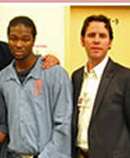
|
|
Teaching the TM technique to the neediest Maharishi University of Management (MUM) alumnus Matt Dixon learned the Transcendental Meditation technique at age ten, but had no idea that one day he would be teaching it in schools and prisons. Matt became serious about practicing TM when he was experiencing stress and lack of fulfillment in his early twenties. He came to MUM to study Maharishi Vedic Science and became a teacher of the Transcendental Meditation technique in 2000. After he graduated from MUM in 2002, he taught the Transcendental Meditation technique part time in Fairfield while working for a local business. In 2007, he taught TM in a high school on a Native American reservation in Nebraska as part of a David Lynch Foundation initiative. Since 2008, he has been working as a full-time teacher of the TM technique. Matt’s first big project began in 2010, when he taught the TM program to inmates in the Oregon State Correctional Institution. Later that year he moved to San Francisco and became the site manager of a Quiet Time program in an inner city high school. For three years he worked in a high-stress environment, bringing relief to students who often came from very challenging backgrounds. “What was fulfilling about the school was that you got to be around these kids and not only give them love and attention, something so many of them don't have, but also a technique to bring relief from anxieties, stresses, and worries,” said Matt. “TM is something that, once learned, cannot be lost; there’s not much these kids have in their lives that is like that." In 2013, in collaboration with the Center for Wellness and Achievement in Education, Matt started a program in the San Francisco County Jail and taught the TM program to approximately 70 inmates and 20 staff and correctional officers. He also gathered data for a pilot study, documenting the benefits of the program for inmates. By the end of the study, inmates reported that they felt less angry, less depressed, more self-controlled, more optimistic, and more likely to think before they act. “The work I have done in prisons and jails is probably my favorite,” said Matt. “Most of us, thankfully, have no idea what it’s like to be in prison. When you’re incarcerated, everything has been literally stripped away from you. It’s a terribly hopeless environment. To go in there and offer TM to the inmates, you can really have a huge positive impact on their lives.”
© Copyright 2015 Maharishi University of Management.
|
|

